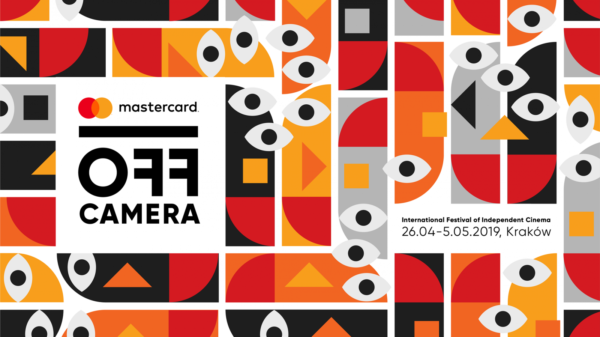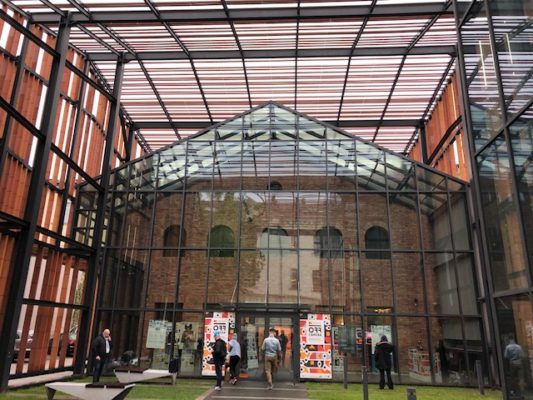
The Mastercard Off-Camera Film Festival is one of the largest festivals in Eastern Europe, running annually for approximately 10 days in late April. This year I had the pleasure of attending the fest when it ran from April 26 – May 5. Taking place in Krakow, the beautiful cultural capital of Poland, the 12th iteration of the festival was divided into several different sections, including:
- Making Way: This is the Main Competition of the festival, which recognizes a director’s first or second film. The Main Competition carries a purse of $100K US for the winner, which was decided by a jury comprised of industry veterans such as Allan Starski, Anna B. Sheppard, Ellen Kuras and Roger Mitchell. The winning film was Sons of Denmark (Salim, 2019), a political thriller about the rise of extremism and anti-immigrant hatred in Copenhagen which contains many uncomfortable real-life parallels.
- The Polish Feature Film Competition, which carries a prize of PLN 100, is reserved exclusively for Polish films. The jury was comprised of Marcia Gay Harden, Laura Rosenthal, Kim Yutani and Jonathan Romney. The winning film was Dolce Fine Giornata / Sweet End of Day (Borcuch, 2019) about a Polish Jewish Nobel Prize Winner living in Tuscany who causes a major disturbance after an awards speech goes politically awry. (Unfortunately there is no English trailer available)
- The rest of the festival screenings are divided across a number of thought-provoking, topical and/or dialogue-prompting sections such as Where Men?; American Indies; Cops & Robbers; It’s Raining Men; Reality, No Thank You; Roses are Red, Violets are Blue; Sport is Health and Us vs Them.
Film Reviews

Polish Feature Film Competition
I split my time between two sections: the Main Competition and the Polish Feature Film Competition. I made a deliberate attempt to seek out the Polish films in particular because I was uncertain how many of them would be able to secure international distribution.
One fascinating film was Ciemno, Prawie Noc / Dark, Almost Night (Lankosz, 2019), a moody thriller that’s a cross between The Girl With The Dragon Tattoo and HBO’s Sharp Objects. The film, an adaptation of Joanna Bator’s well-known Polish novel of the same name, follows reporter Alicja (Magdalena Cielecka) as she returns home for the first time in years in the wake of her abusive childhood (revealed slowly in nightmares). Alicja has chosen to return at this particular moment in order to investigate a series of child abductions, but there’s a great deal more to the crimes, her own story and the town than meets the eye.
Dark, Almost Night is not a perfect film, in that it frequently struggles to balance Alicja’s backstory with the strange events occurring around town. The film is overstuffed with characters and subplots, including a group of mysterious cat-women, Nazis, and Alicja’s mysterious neighbour and his shady nephew, the latter of which Alicja begins sleeping with. I was amazed to learn after the screening that the film actually excises a great deal of the book’s content because it already feels like it’s bursting at the seams!
Still, there’s something incredibly evocative about the sumptuous visual aesthetic of the film, which walks a razor’s edge between adult fairytale and dark crime thriller. The film is certainly not for the faint of heart: there is a great deal of child abuse, rape and murder, but the grim and fatalistic tale is never boring and it is frequently gorgeous to look at. The subject matter alone makes me doubt whether the film will find North American distribution, but if mystery and thriller fans can ever lay eyes on it, Dark, Almost Night is worth checking out.
No less ambitious, but even more confronting, is Jagoda Szelc’s second film, Monument (2018). The film, which doubles as a thesis project for real life actors graduating from the National Film School in Łódź, is an intersection between a workplace drama and Lynchian nightmare.
Monument follows a group of hospitality students completing an internship in a rundown hotel who are put through their paces by a severe authoritarian manager, but the film eschews a straightforward narrative in favour of monotonous, repetitive and surreal sequences that hint at there is something more nefarious and otherworldly.
Playing out like a waking dream, Monument boasts outstanding visual sequences and incredible sound design, but the experimental (occasionally non-sensical) plot and philosophical diatribes will undoubtedly turn off a mainstream audiences. Personally I loved the film’s audacity, particularly Szelc’s pre-screening video introduction, where she encouraged audiences to avoid resisting or unpacking the film in favour of simply letting go, accepting the confusion and acknowledging different interpretations. Not every director has the gumption, but Monument wears its ambition on its sleeve, and for that it and Szelc deserve recognition. Of all of the films that I saw at Off Camera, this is one of two films that I really hope gets distributed in North America.
Making Way Main Competition Films
While Sons of Denmark took home the biggest prize of the festival, it was by far my least favourite of the four Making Way films that I watched (in brief: the first half is great and then it falls into hysterical melodrama and the resolution is laughable and desperate to solicit an emotional reaction). It’s disappointing considering the other three films were far superior, including the one Polish film in contention, Adrian Panek’s Wilkolak / Werewolf (2018).
https://www.youtube.com/watch?v=ZKbQxP76KWw
Comparing the film to Lord of the Flies diminishes the achievement of this post-WWII film about a group of orphans who are liberated from the concentration camps and left to their own devices at a mansion in the woods. There’s a great deal more going on that than a simple redux of Golding’s “children forming their own society” narrative.
Werewolf quietly tackles a little known piece of history while crafting a smart, frequently nail-biting narrative of children imprisoned in a decaying manor by a pack of blood-thirsty, Nazi-trained dogs living in the wild. The performances are uniformly excellent, particularly Sonia Mietielica as Hanka, the defacto “adult” of the group who is required to parent the others against her will because she is the oldest.
Bonus points for making the dogs legitimately terrifying without resorting to CGI. I wouldn’t recommend this film to anyone with a prevailing fear, however; you may never pet another stray again.
Another unnerving thriller is Swiss film Der Laufer / Midnight Runner (Baumgartner, 2018). Terrifyingly based on real events, the film follows Jonas Widmer (Max Hubacher), an Olympic running hopeful whose late night runs are secretly escalating from low level attacks on random women into something much, much darker.
Baumgartner structures the first part of the film in a deliberately confusing fashion so that it is unclear when events are happening, including the death of Jonas’ beloved brother and a crushing second place finish in a significant race. Unable to process his emotions, or confide in his well-meaning girlfriend, Jonas begins running late at night. One night he tries to help a woman who has tripped on the sidewalk, but when she berates him, he impulsively steals her purse. From there the aggression and violence of his late-night attacks escalate, affecting his relationship and his training, even as Jonas struggles to understand or control his own actions.
It’s an amazing lead performance by Hubacher, who manages to engender both sympathy for Jonas as well as condemnation for his increasingly despicable acts. Midnight Runner is a great, albeit difficult film that perfectly encapsulates the systemic dangers of toxic masculinity, entitlement and the justifiable fear that women have of men.
The single best film that I saw at Off Camera was Dronningen / Queen of Hearts (el-Toukhy, 2018). The Danish/Swiss co-production is about Anne (Trine Dryholm), a high profile lawyer with a seemingly perfect family who torpedos her entire life when she begins sleeping with her troubled stepson, Gustav.
Queen of Hearts is a character study of an impulsive, extremely intelligent woman. Anne knows what she is doing is wrong because she not only hides her infidelity, but she literally works exclusively on cases of child endangerment at her legal practice. Dryholm is absolutely phenomenal in the lead role: her Anne is complicated, messy and horrible and the drama she wreaks as a result of her selfish actions is compulsively watchable. The fact that el-Toukhy and co-screenwriter Maren Louise Käehne lean into the moral murkiness and allow the story to play out without condemnation or judgment speaks to the confidence of the filmmaking on display. Queen of Hearts definitely isn’t a feel good story, but I loved every second of its terribleness and I can’t wait for the film to break out as it continues to play the festival circuit.
Festival News
This year the Off Camera festival office took up a new residence just off of the historical town square in downtown Krakow. While the newer, more modern interior hall doesn’t have the same patio and old world charm as its predecessor, the larger size is roomier and more accommodating for guests, which is a welcome change when you’re rubbing elbows with the cream of the Polish film industry crop during the industry parties each night.
In addition to film screenings and industry social opportunities, the festival also offers workshops, panel discussions and networking events designed to bring together individuals working in the film industry. At one of the networking event, I learned that the Off Camera Foundation is running a project, funded by the EU, called “Film In Malopolska” through June 2019. The project centers on the promotion of small and medium-sized productions in the region in both domestic and foreign markets, marketing Malopolska as an ideal region for film productions. Attendees at the event hinted that entrepreneurs in the film industry plan to take advantage of the program, which should bring even more productions to the Malopolska region in the near future.
Finally, as a first time attendee of the festival, one of the most impressive features that I want to highlight is Festival TV, a news feature that is updated daily and run in front of film screenings. The ~5-7 minute promo features notable items from the previous day, including interviews with directors and industry panels and footage from the live musical acts that perform nightly, as well as previews of what audiences can expect the following day. It’s a professionally produced piece of news entertainment that keeps the festival feeling fresh each day. It also demonstrates the level of time and investment that staff are putting in to make the experience of festival goers memorable and engaging. Other festivals could learn a thing or two about such ambitious efforts.
The Off Camera Film Festival runs each April in Krakow, Poland. For more information, visit the festival website here.
